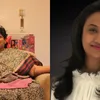Inspired by Grace Hopper, this mother-daughter duo launched a website for curated, inspiring stories
Rachana and Sonika Agarwal started Storydip so that everyone can dip into the vast stories the world has to offer. Their focus is on English and Hindi stories with female protagonists, who can inspire girls and give wings to their dreams.
Rachana Agarwal, mother to three girls, says she was always looking for better role models when her children were growing up.
She began telling them stories when they were very young and soon learned what a deep impact they were making on her children. At first, the impact seemed to be an improved memory, but that evolved into something more interesting: an active curiosity.
So much so that her daughter Sonika began studying subjects that interested her during her free time. By the age of 13, she had started to explore the financial markets.
At 15, Sonika taught herself full-stack web development purely through resources on the internet.
Who run the world?
This unsatiated curiosity and a conversation on how it was difficult to find good stories with female protagonists on the internet led Sonika to code storydip.com, which she develops along with Rachana, who curates the stories.
A company secretary by qualification, Rachana chose to be a homemaker. The passion for stories and scientist Grace Hopper’s story led her to start Storydip along with her daughter.
Sonika shares that more than an incident, a series of events led to Storydip.
“As a child, my mother used to tell us stories every night. One of the stories about Grace Hopper, a renowned computer scientist, sparked my interest. I also realised that even though I had heard sexist comments all my childhood such as my aunt casually mentioning how all girls were a financial burden to their parents, I was only able to have a positive self-image because of the stories my mother told me,” she says.
One thing that stuck in her mind about Grace Hopper was her clock that ran counter-clockwise - simply to remind herself that things did not always have to be done in a traditional way.
The stories Rachana told her children often related to social issues, which made them aware about the condition of women in India.
“I got to know that 30 percent of women in India are still uneducated and India’s GDP could grow by 25 percent if they were merely encouraged to study and work. But since not every child has a mother that can search for stories for hours every day, I developed storydip.com to share my childhood experience with those kids,” Sonika says.
The power of stories

(Different genres of stories on Storydip platform)
Sonika believes everyone likes listening to stories, and it’s not without reason.
With wisdom far ahead of her years, she points out a simple scientific fact. “When listening to hard facts, only the language-processing parts of our brain are put to work. However, when listening to a story, all the parts of the brain that would be activated had we been the character of the story are activated.
For example, if you read the sentence, ‘She threw the ball,’ the motor cortex, which coordinates motion of your brain, also activates. This gives us the ability to put ourselves in someone else’s shoes and allows for empathy and understanding.”
Storydip is currently a tag-based playlist of video stories curated from across the internet across cultures. It has old tales from the Panchatantra, and new stories dealing with depression, exam stress, or suicidal tendencies, and girl power.
The plan is to expand existing categories and offer inspiring real-life stories on discrimination, science, and climate change.
The duo plans to grow it into a platform that can reach young girls and marginalised people and help them with their struggles by offering relatable stories.
Rachana explains, “On the one hand, we have YouTube, which offers all kinds of videos of all kinds of topics, and on the other we have websites such as TED, that specifically focus on original speeches.
"I believe our website leans more towards the TED-end of the spectrum, but is aimed at a very different audience. It provides stories of multiple genres sorted with an easier filtration interface. The motive also differs; we offer stories as solutions to problems that children or teens might be facing.”
As of now, the duo is promoting the website in Kolkata schools and using feedback to improve the platform.
Sonika handles the tech part of the website while Rachana compiles the stories. Since they want this platform to reach the underprivileged, access is completely free.
Maintaining a fine balance
So, how does Sonika manage academics and the platform?
“Storydip helps me apply what I have studied about coding in real time and understand the theory in depth. The knowledge I gain from studying helps me improve the platform. Of course, I am not able to perfectly balance it. Sometimes, I start doing one thing and completely forget about the other. However, I manage to complete the tasks I set for myself on time,” she says.
Their future objective is to get more users, receive feedback, learn from the experience, and work on scaling it further.
“We will also work on a better form of classification and on making the website more interactive, perhaps with artificial intelligence. In terms of impact, however, I want to help the 30 percent of the illiterate women in India.
“I hope Storydip can give them strength to fight as they listen to stories with relatable protagonists and not be burdened by the narrow expectations placed upon them. As a 16-year-old, I might not be able to change the view of society, but I’ll do what I can and hope maybe someday I can make a dent,” Sonika says.
Edited by Teja Lele









